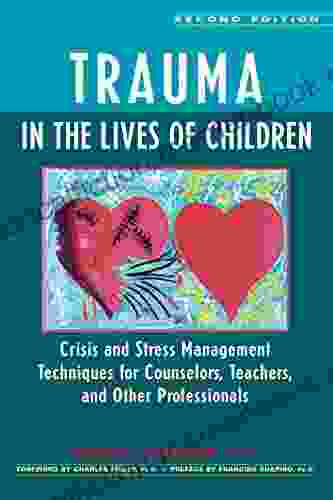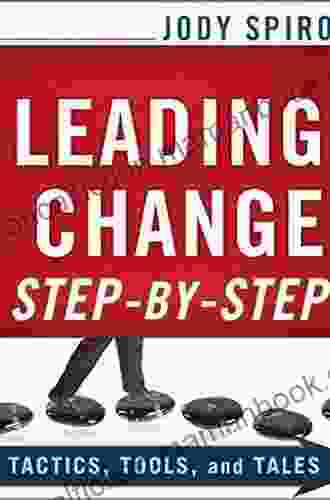Crisis and Stress Management Techniques for Counselors, Teachers, and Others

Working with people in crisis can be challenging and stressful. Counselors, teachers, and other professionals who provide support to others need to be able to recognize the signs of a crisis, provide support, and take care of themselves.
4.5 out of 5
| Language | : | English |
| File size | : | 4555 KB |
| Text-to-Speech | : | Enabled |
| Screen Reader | : | Supported |
| Enhanced typesetting | : | Enabled |
| Word Wise | : | Enabled |
| Print length | : | 350 pages |
This article provides an overview of crisis and stress management techniques for counselors, teachers, and other professionals. It includes information on:
- The signs of a crisis
- How to provide support
- How to take care of yourself
The Signs of a Crisis
A crisis is a situation that is perceived as threatening or overwhelming. It can be caused by a variety of events, such as a natural disaster, a traumatic event, or a personal loss. The signs of a crisis can include:
- Increased anxiety or fear
- Withdrawal from social activities
- Changes in sleep or eating habits
- Difficulty concentrating
- Increased irritability or anger
- Feelings of hopelessness or despair
- Suicidal or homicidal thoughts
It is important to note that not everyone who experiences a crisis will display all of these symptoms. However, if you are concerned about someone, it is important to reach out and offer support.
How to Provide Support
If you are working with someone who is in crisis, it is important to:
- Stay calm and reassuring. Let the person know that you are there for them and that you care.
- Listen without judgment. Allow the person to talk about their feelings and experiences without interrupting.
- Validate the person's feelings. Let them know that their feelings are normal and that you understand what they are going through.
- Help the person to identify their needs. Ask them what they need from you and what would be helpful.
- Provide practical support. This may include helping the person to find resources, such as a therapist or a support group.
- Follow up with the person. Check in with them regularly to see how they are ng and to offer ongoing support.
It is important to remember that you are not responsible for fixing the person's problems. Your role is to provide support and to help them to cope with the crisis.
How to Take Care of Yourself
Working with people in crisis can be stressful. It is important to take care of yourself so that you can continue to provide support to others. Here are a few tips for self-care:
- Set boundaries. It is important to set limits on how much you are willing to give of yourself. Do not take on more than you can handle.
- Take breaks. It is important to take breaks throughout the day to rest and recharge. Step away from your work and do something that you enjoy.
- Talk to someone. If you are feeling overwhelmed, talk to a friend, family member, or therapist. Talking about your experiences can help you to process them and to feel less alone.
- Practice self-care activities. Make time for activities that make you feel good, such as exercise, meditation, or spending time in nature.
Remember that you are not alone. There are people who care about you and want to help. If you are struggling, reach out for support.
Working with people in crisis can be challenging and stressful, but it is also rewarding. By learning how to recognize the signs of a crisis, how to provide support, and how to take care of yourself, you can help others to cope with difficult times.
If you are interested in learning more about crisis and stress management, there are a number of resources available. You can find books, articles, and online courses on the topic. You can also reach out to a mental health professional for support.
4.5 out of 5
| Language | : | English |
| File size | : | 4555 KB |
| Text-to-Speech | : | Enabled |
| Screen Reader | : | Supported |
| Enhanced typesetting | : | Enabled |
| Word Wise | : | Enabled |
| Print length | : | 350 pages |
Do you want to contribute by writing guest posts on this blog?
Please contact us and send us a resume of previous articles that you have written.
 Top Book
Top Book Novel
Novel Fiction
Fiction Nonfiction
Nonfiction Literature
Literature Paperback
Paperback Hardcover
Hardcover E-book
E-book Audiobook
Audiobook Bestseller
Bestseller Classic
Classic Mystery
Mystery Thriller
Thriller Romance
Romance Fantasy
Fantasy Science Fiction
Science Fiction Biography
Biography Memoir
Memoir Autobiography
Autobiography Poetry
Poetry Drama
Drama Historical Fiction
Historical Fiction Self-help
Self-help Young Adult
Young Adult Childrens Books
Childrens Books Graphic Novel
Graphic Novel Anthology
Anthology Series
Series Encyclopedia
Encyclopedia Reference
Reference Guidebook
Guidebook Textbook
Textbook Workbook
Workbook Journal
Journal Diary
Diary Manuscript
Manuscript Folio
Folio Pulp Fiction
Pulp Fiction Short Stories
Short Stories Fairy Tales
Fairy Tales Fables
Fables Mythology
Mythology Philosophy
Philosophy Religion
Religion Spirituality
Spirituality Essays
Essays Critique
Critique Commentary
Commentary Glossary
Glossary Bibliography
Bibliography Index
Index Table of Contents
Table of Contents Preface
Preface Introduction
Introduction Foreword
Foreword Afterword
Afterword Appendices
Appendices Annotations
Annotations Footnotes
Footnotes Epilogue
Epilogue Prologue
Prologue Shelley Marshall
Shelley Marshall Nausicaa Twila
Nausicaa Twila Katherine L Evans
Katherine L Evans Erik Pihel
Erik Pihel Kameron Snow
Kameron Snow Deborah Harkness
Deborah Harkness Charity Grant
Charity Grant Vitaly Ju
Vitaly Ju Tera Lynn Childs
Tera Lynn Childs Madeline Puckette
Madeline Puckette Irving Chernev
Irving Chernev Mark Bibbins
Mark Bibbins Michelle Diener
Michelle Diener Amir Levine
Amir Levine Pascale Petit
Pascale Petit Vern Thiessen
Vern Thiessen Eliane Souza
Eliane Souza Lara Temple
Lara Temple Haley Windrow
Haley Windrow Kendall Johnson
Kendall Johnson
Light bulbAdvertise smarter! Our strategic ad space ensures maximum exposure. Reserve your spot today!

 Benjamin StoneThe Art of Storytelling: A Comprehensive Guide to Captivating Your Audience
Benjamin StoneThe Art of Storytelling: A Comprehensive Guide to Captivating Your Audience H.G. WellsFollow ·16.6k
H.G. WellsFollow ·16.6k Todd TurnerFollow ·10.9k
Todd TurnerFollow ·10.9k Ralph EllisonFollow ·3.1k
Ralph EllisonFollow ·3.1k George R.R. MartinFollow ·16.4k
George R.R. MartinFollow ·16.4k David MitchellFollow ·5.7k
David MitchellFollow ·5.7k Miguel NelsonFollow ·8.3k
Miguel NelsonFollow ·8.3k Thomas HardyFollow ·8.4k
Thomas HardyFollow ·8.4k Jorge AmadoFollow ·11.9k
Jorge AmadoFollow ·11.9k

 Allen Ginsberg
Allen GinsbergUnlocking Financial Peace with Low Risk Investing: A...
In the world of investing, it is often said...

 Eddie Powell
Eddie PowellLoop of Jade: An Exploration of Grief, Memory, and the...
Sarah Howe's...

 Zachary Cox
Zachary CoxHealth Benefits in Retirement: Navigating the Maze of...
Retirement...
4.5 out of 5
| Language | : | English |
| File size | : | 4555 KB |
| Text-to-Speech | : | Enabled |
| Screen Reader | : | Supported |
| Enhanced typesetting | : | Enabled |
| Word Wise | : | Enabled |
| Print length | : | 350 pages |
















